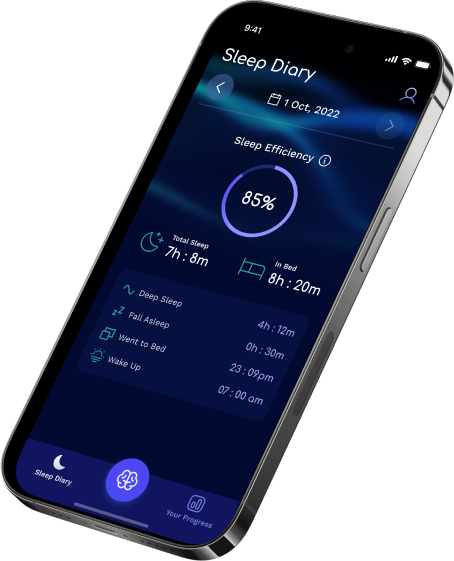
Work is one of the major causes of sleep problems for many people.
This is especially true in modern societies with a disciplined and workaholic culture, like South Korea and Japan. These are countries that, from time to time, show us examples of people who literally die from overworking.
But let’s not make the mistake of just focusing on extreme examples like those; otherwise, we risk reducing the importance of our own personal issues, simply by comparison.
For that reason, I wrote this article to discuss how work interferes with sleep and how sleep interferes with work.
That last part may be of particular interest to employers — I will argue why they should care about their employees’ sleep from a business and productivity point of view. Finally, actionable solutions will also be presented.
Let’s begin.
🔎 Feel free to jump to your preferred section in this article:
1. How Sleep Deprivation Affects the Employee’s Work
2. Solutions For the Employer
3. Solutions For the Employee
1. How Sleep Deprivation Affects the Employee’s Work
I have discussed previously how sleep deprivation can negatively affect our physical and mental health. All the consequences listed in that article are relevant. However, today I’ll be focusing on those that can impact work and productivity directly.
1.1. Reduced Cognitive Functions
Cognitive functions will be one of the first things to go whenever sleep deprivation sets in, namely:
1.1.1 Reduced Attention and Focus
Reduced attention might make the worker more absent-minded and miss out on essential instructions or critical details that are transmitted to them.
Reduced focus will prevent the worker from concentrating on a task for long. A software developer that needs to work on a complex piece of code might be unable to do so, constantly getting distracted, and unable to maintain elaborate and logical chains of thought.
1.1.2 Increased Reaction Times
Sleep deprivation will increase the time it takes for someone to react to certain stimuli. This can have consequences that range from inconvenient to life-threatening.
For instance, a sleep-deprived delivery driver drives on the highway and a car in front suddenly brakes. Taking some extra few seconds to react to that can result in a collision.
Work-related accidents may lead to medical expenses and legal liabilities.
1.1.3 Reduced Decision-Making
When someone has reduced decision-making skills, they will be unable to make clear and effective choices in a timely manner.
A customer support representative might make hasty or incorrect decisions about refunds or replacements, potentially causing financial losses for the company.
1.1.4 Reduced Memory
Suffering from sleep-induced brain fog and memory loss can make someone forget essential details when it matters the most.
For instance, a salesperson could forget important details about a client’s preferences discussed in a previous meeting, ending up with them losing the deal.
1.1.5 Reduced Learning
The ability to learn new information or skills also decreases during sleep deprivation.
An example could be a trainee in a software company struggling to grasp new programming concepts introduced during a training session.
1.1.6 Poor Communication
Having low brain power as a consequence of lack of sleep can lead to the inability to convey or interpret information effectively and clearly.
For instance, a project manager might ambiguously describe task requirements to their team, leading to misunderstandings and project delays.
1.2 Micro-sleeping
Sleep deprivation can result in micro-sleeping events, where the employee falls asleep involuntarily for just one second or multiple seconds.
The consequences of micro-sleeping can be similar to the ones resulting from increased reaction times — in the worst-case scenario, it can lead to life-threatening accidents.
An example could be a construction worker micro-sleeping while operating heavy machinery, leading to injuries and equipment damage.
1.3 Loss of Motivation
Workers with higher sleep quality have been found to have higher job satisfactionx and motivation to work.
1.4 Absenteeism and Delay to Work
Studies have shown that there is a correlation between absenteeism and delay to work, and sleep deprivationx.
1.5 Performance Deterioration
As you can expect, a sleep-deprived, unmotivated, and cognitively impaired worker will not be in their top form to get the results that matter to the company. Therefore, you can expect:
- Lower quality of work
- Lower efficiency and productivity (which means increased costs to the business)
- Reduced customer satisfaction.
1.6 Emotional Instability
Another consequence of poor sleep is lower emotional stability, which results in:
- Lower capacity to cope with stress
- Unregulated emotions
- Neuroticism and negative thinking will increase due to the impairment of the prefrontal cortexx
- Information is more influenced by emotions, rather than by objective facts. This is the result of an unregulated amygdalax
An example could be a stressed-out, sleep-deprived nurse becoming overwhelmed and reacting with irritability towards patients, comprising patient care and hampering recovery.
1.5 Interpersonal Relationship
Lack of sleep can make it harder to recognize and respond to social cues (e.g. facial expressions, body language, and tone of voice).
This can make the worker less empathetic and more prone to conflicts with others.
Example: during a project review with clients, a designer might fail to notice their subtle expressions of uncertainty about a design element. Instead of addressing these concerns, the designer might proceed without making necessary adjustments, leading to potential dissatisfaction with the final project.
2. Solutions For the Employer
Hopefully, the previous section is a strong enough argument to convince an employer to start thinking in a more counter-intuitive way: it turns out that working longer hours does not equal better work done. And worse-quality work equals unhappy clients and customers.
Forward-looking employers will understand this point well and won’t need much further convincing.
So the question is what can they do to show they care about their employee’s sleep? I’ll show some possible solutions below:
2.1 Educational Initiatives
One strategy to promote better sleep and enhance work performance is to implement workplace interventions that focus on educational initiatives.
These initiatives aim to provide employees with information and guidance on the importance of sleep.
Educational initiatives can take various forms, such as:
- Workshops
- Seminars
- Webinars
- Newsletters
- Posters
- Flyers
- Online modules.
👨🏻⚕️ Pro-Tip: If you are looking for a sleep professional that provides these types of services, explore Sleep Atlas, our free sleep database, where you can find the right solution to your needs.
They can also be tailored to the specific needs and preferences of different groups of employees, such as shift workers, managers, or young professionals.
2.2 Sleep Tracking Tools
Sleep tracking tools can help identify the factors that affect the quality and quantity of your workers’ sleep.
Sleep evaluation tools can include:
- Self-report questionnaires.
- Sleep diaries.
- Actigraphy.
- Polysomnography.
- A combination of these methods.
Here at Drowzee Analytics, we offer solutions that fulfill this role. A simple use-case to understand would be this:
- Employees interested in participating would install LucidLink on their phones and start tracking their sleep patterns.
- The employer would install Exleep on their desktop and start collecting the sleep data from the employees using LucidLink.
By assessing the sleep patterns and habits of employees, it would be possible to:
- Act on an individual level, designing tailored interventions to improve the sleep of specific employees.
- Detect broader trends within the company — if the sleep quality of a large percentage of employees has been decreasing lately, then it might be time to develop a plan to solve that issue, to prevent all the negative aspects discussed previously, ranging from decreased productivity to lower work quality.
Sleep evaluation tools help monitor the progress and outcomes of the interventions, and provide feedback and guidance to the employees and the employers.
2.3 Power Naps
The third and final tip for employers is to incorporate napping rooms or pods in the workplace to allow for power naps.
Is this idea so crazy? No, because multiple science papersxy have already found that people who nap at work are more productive, perform better, are more creative, and have a better memory.
And aren’t these the characteristics an employer wants in an employee? Isn’t getting those extra benefits out of a worker worth paying 6-30 minutes of their time so that they can have an afternoon siesta?
Run the numbers, and you might be surprised — you’ll promote a good healthy culture in your workplace (which brings its own benefits), while also using a strategy that gives you a competitive edge. Sounds like a good deal to me.
3. Solutions For the Employee
Just as employers should be proactive in promoting better sleep for their employees, the employees, in turn, should meet them halfway and assume some responsibility as well.
Here are three steps they can take.
3.1 Improving Sleep Hygiene
This is the age-old advice that everyone should follow: work on improving your sleep hygiene. These are habits and lifestyle changes that will improve your sleep quality.
Things like:
- Have a consistent sleep schedule: go to bed and wake up at the same time every day, even on weekends.
- Improve your sleep environment: have a dark and quiet bedroom.
- Invest in a comfortable mattress and pillows.
- Use technology responsibly before bedtime.
- Have a sleep-supporting diet.
- Exercise regularly.
- Learn how to relax: do deep breathing, meditation, or reading to wind down before sleep.
3.2 Treat Any Underlying Sleep Disorders
If you have trouble sleeping at night, you might suffer from a sleep disorder. In that case, you should consult with your doctor or a sleep specialist to be correctly diagnosed and receive individualized treatment.
Additionally, you have at your disposal a vast amount of techniques that help treat sleep disorders like insomnia and their underlying symptoms like anxiety and depression. You can read our complete and extensive list of Sleep Deprivation Solutions to find the ones that fit you best.
3.3 Improve Work-Life Balance
Work-life balance — or should I call it imbalance? — really can be one of the leading causes of sleep deprivation.
However, this issue doesn’t affect everyone equally and may require different solutions depending on your case.
3.3.1 Get Offline
Your work-life balance may be skewed if you keep receiving calls and messages after work hours, causing you to remain anxious and engaged with work even at home.
This might be acceptable to you, but if it constantly interferes with your sleep, you should start using technology responsibly.
You should avoid all work-related notifications in the evening. To achieve this successfully, you may need to tell your colleagues and supervisors that your job performance is being impacted due to your sleep deprivation and that this is caused by the lack of boundaries between your work and your life.
3.3.2 Cognitive Behavioral Therapy
If you are a workaholic and simply don’t have a work-life balance by choice, that is within your right.
Maybe you are an entrepreneur or a startup founder who is working on something that could improve the world for the better.

However, if you feel that you have reached a point where you are losing hours of sleep to focus on work and that it is becoming something outside of your control… then you might need to consider a solution like Cognitive Behavioral Therapy.
A CBT specialist will work closely with you. They will help form new thinking habits and behaviors. This will allow you to lead a more balanced life that you feel is under your control.
👨🏻⚕️ Pro-Tip: If you are looking for a CBT professional to work with you, explore Sleep Atlas, our free database, where you can find the right solution to your needs.
Remember, all the consequences of sleep deprivation listed in this article still apply to you, even if your work is super important. So the same logic applies — to avoid burnout and low-quality results, try to sleep more.
To read more about workaholism and sleep problems, read this article.
3.3.3 For Freelancer: Better Time Management
Due to the nature of their work, freelancers can have more flexibility and autonomy over their schedules, but this can result in them not having a strong external force dictating their sleep schedules (that’s what a 9-5 job does).
They may also have to work across different time zones, juggle multiple projects, or deal with inconsistent and oscillating working hours throughout the year (there may be months when there’s no income, and months when they need to work 12+ hours a day).
This can result in poor sleeping habits for the freelancer.
However, this is not a good long-term strategy. As freelancers gain more experience, they typically are forced to develop better time-management skills, learn how to prioritize tasks, and set boundaries.
The good news is that these things will typically be easier to implement as the freelancer grows in reputation and competence, allowing him to find better clients who pay more, offer more consistent and reliable work, and respect the freelancer’s demands more.
4. Bonus Benefit — Less Age Discrimination
One final benefit that can come from the employer accepting that long working hours don’t tend to result in better work is the reduction of age discrimination in the workplace.
One of the reasons older people are discriminated against is due to the preconceived notion that they can’t or won’t work those long hours.
This preconceived notion is likely based on reality, don’t get me wrong. Older people are more likely to suffer from some health condition that impedes them from working the same extreme amount of hours that a 21-year-old can. Or maybe they are wise enough to know that life is not just about work.
Regardless, the point is this — all those things are irrelevant because long working hours are not productive anyway.
Adopting this new mindset can result in reconsidering older people as valid as anyone else to work in a company — with the added benefit that those folk have lots of experience and knowledge to offer.
FAQ – Answering Some Questions
Q: I or my employee have a really important deadline next week. Are you saying we should call our client and tell them we can’t do it because we need to sleep instead ❓
Acute (or short-term) sleep deprivation will still impact you or your employee negatively with some of the consequences listed above, such as lower-quality work. But yes, life sometimes imposes itself on us, and if occasionally you need to lose some hours of sleep to meet that deadline, then so be it. However, when that attitude becomes part of the working culture in your company, then that’s when chronic sleep deprivation begins. That type of scenario is what you want to avoid, because, as shown in this article, that’s a lose-lose situation.
For some further insights into this topic, read the article I wrote.
Q: I work two jobs and I can’t follow the advice given in this article, to improve my sleep hygiene, what now ❓
It’s tough. Do whatever small things you can and try not to worry about it. Stressing about a negative situation can amplify its negative effects, while not worrying about it can act as a shield against those effects.
Also, try using our LucidLink app to track your sleep, moods, and habits. If you use it long enough, you can find correlations telling you which things improve your sleep quality and which don’t. Once you find out what those things are, you can apply those changes to your lifestyle.
Conclusion
Sleep and work are two concepts that influence each other. Sleep can influence work positively or negatively. And work is seen as something that can influence sleep negatively.
However, seldom do people talk about work influencing sleep positively.
The main aim of this article is to challenge that perspective — what if we lived in a world where companies had systems in place that benefited everyone who came into contact with them, from customers to employees?
I will leave you with that vision for the future.

🌙 If you enjoy sleep-related content, join our community! Subscribe to our newsletter, follow us on your favorite social media, and join us for a real-time chat on Discord ☀

